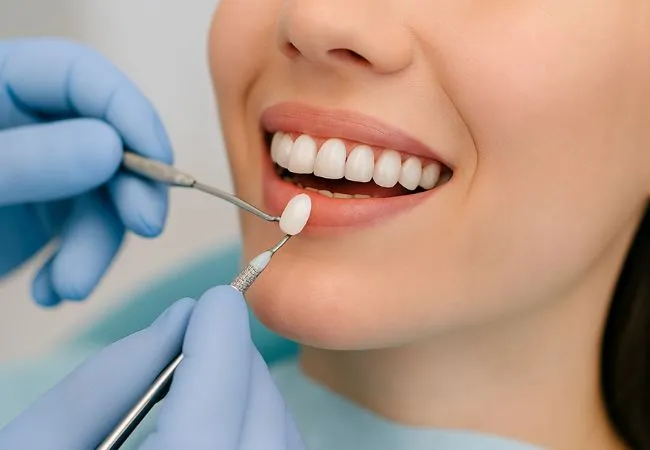When it comes to improving your smile, dental veneers are one of the most popular and effective cosmetic treatments available. They can correct discolouration, chips, gaps, and even minor misalignment, giving you the smile you have always wanted.
But one of the first questions patients ask is: how long do dental veneers last? Since veneers are an investment in both your appearance and oral health, understanding their lifespan is important.
At Stadium Dental in Vancouver, we help patients select the right veneers and offer guidance on how to maintain them for optimal longevity. Let’s break down the typical lifespan of veneers, the factors that affect it, and what you can do to protect your new smile.
Average Lifespan of Dental Veneers
On average, porcelain veneers last 10 to 15 years, while on the other hand composite veneers last 5 to 7 years. With excellent oral care, porcelain veneers can even last up to 20 years or more.
The difference in lifespan comes down to the materials used. Porcelain is stronger and more resistant to staining, while composite resin is less expensive but more vulnerable to wear and discolouration. So, how long do dental veneers last? It depends not only on the type you choose but also on how you care for them.
Porcelain Veneers: Long-Term Durability
Porcelain veneers are thin, custom-made shells crafted in a dental lab to fit over your natural teeth. They’re known for their durability and lifelike appearance.
Average Lifespan: 10–15 years (and sometimes longer with proper care)
Advantages:
- Highly resistant to stains from coffee, tea, and wine
- Strong and durable, with the ability to withstand daily chewing
- Reflects light like natural enamel, providing a realistic look
Limitations:
- Higher upfront cost compared to composite veneers
- Requires some enamel removal during placement (not reversible)
For patients in Vancouver seeking a long-term smile solution, porcelain veneers are often the best investment.
Composite Veneers: Affordable and Quick
Composite veneers are made from tooth-coloured resin, applied directly to the teeth and shaped in the dentist’s chair.
Average Lifespan: 5–7 years
Advantages:
- Lower cost than porcelain veneers
- Can often be completed in a single visit
- Easy to repair if chipped or damaged
Limitations:
- Prone to staining and discolouration
- Not as durable as porcelain
- Shorter overall lifespan
Factors That Affect How Long Veneers Last
Now, let us go deeper into what really determines how long dental veneers last. Several key factors influence their durability:
- Oral Hygiene Habits – Brushing twice a day and flossing daily helps prevent decay and gum disease, which can shorten the lifespan of veneers.
- Biting and Chewing – Using your teeth to bite ice, open packages, or chew hard foods can cause veneers to chip or crack.
- Teeth Grinding (Bruxism) – Grinding or clenching your teeth puts extra pressure on veneers, which can lead to wear or damage. A night guard can help protect them.
- Diet and Lifestyle – Drinks like coffee, tea, and red wine can stain composite veneers. Smoking also accelerates discolouration and weakens gums.
- Dental Materials and Skills – Veneers placed with high-quality materials by an experienced dentist, such as those at Stadium Dental, are more likely to last longer.
Signs It’s Time to Replace Veneers
Even the best veneers won’t last forever. Here are some signs you may need a replacement:
- Chipping or Cracking: Damage to the veneer surface that affects appearance or function.
- Staining or Discolouration: Particularly with composite veneers, stains that don’t respond to whitening.
- Gum Recession: When gums recede, the edges of veneers may become exposed.
- Loose Veneers: If they detach or feel unstable, replacement may be necessary.
If you notice any of these issues, it’s best to book a consultation to explore your options.
How to Make Veneers Last Longer
So, how can you extend how long dental veneers last? Here are practical tips:
- Maintain excellent oral hygiene: Brush and floss daily using non-abrasive toothpaste.
- Avoid chewing on hard objects: This includes ice, fingernails, and pens.
- Protect against grinding: Wear a custom night guard if you grind your teeth.
- Watch your diet: Limit stain-causing foods and drinks, or rinse your mouth after consuming them.
- Regular dental check-ups: Visit your dentist in Vancouver at least twice a year for cleanings and exams.
Comparison Summary
Porcelain Veneers:
- Lifespan: 10–15 years (sometimes 20+)
- Strong, durable, and stain-resistant
- More expensive but longer-lasting
Composite Veneers:
- Lifespan: 5–7 years
- More affordable, but stains and chips faster
- Easier to repair, but shorter overall durability
Veneers in Vancouver: What to Expect at Stadium Dental?
At Stadium Dental in Vancouver, we specialise in creating veneers that not only look natural but also stand the test of time. During your consultation, we’ll:
- Assess your teeth and gums to ensure veneers are the right choice.
- Explain the pros and cons of porcelain vs. composite veneers.
- Show you digital previews so you can visualise your new smile.
- Guide you through aftercare practices to maximise veneer longevity.
Our goal is to provide you with a smile that’s both beautiful and long-lasting.
Conclusion
So, how long do dental veneers last? The answer depends on the type of veneers you choose, your oral hygiene, and your lifestyle. Porcelain veneers typically last 10–15 years, sometimes even longer, while composite veneers last around 5–7 years. Remember that with the proper care and regular dental visits, your veneers can continue to look beautiful and function well for many years.
If you’re considering veneers in Vancouver, book a consultation with Stadium Dental today. Our team will help you choose the right option and provide expert care to make your new smile last.
